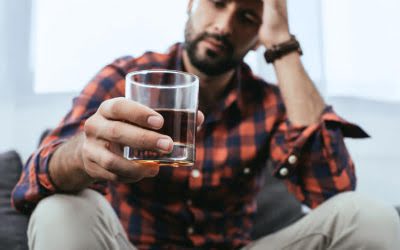Parkinson’s Disease and Alcohol: Is There a Link?
They can also develop addictions, cravings and compulsions, and a joyless state known as “anhedonia.” Elevated levels of dopamine can cause anxiety and hyperactivity. On the other hand, some people with PD may tolerate moderate alcohol consumption without significant worsening of symptoms. It’s important to discuss this with a healthcare professional to determine what is safe and appropriate for you. The detailed necropsy procedures used to harvest tissues [28] and obtain ex vivo slices [8] have been previously described. A block containing the caudate and putamen was microdissected from the left hemisphere and sectioned with a VT1200S (Leica, Buffalo Grove, IL) in a sucrose cutting solution aerated with 95% O2/5% CO2 (see Supplementary Materials for composition).

Altogether, our findings demonstrate that long-term alcohol consumption can sex-dependently alter dopamine release, as well as its feedback control mechanisms in both DS subregions. Glutamate is the major excitatory neurotransmitter in the brain and it exerts its effects through several receptor subtypes, including one called the N-methyl-D-aspartate (NMDA) receptor. As an example, the agent acamprosate modulates glutamate transmission by acting on NMDA and/or metabotropic glutamate receptors.[30] Therefore, by reducing excessive glutamate activity, acamprosate blocks excessive alcohol consumption. Indeed, our analysis of dopamine transient dynamics revealed faster dopamine uptake in caudate and putamen of alcohol-consuming female, but not male, macaques.
Is the conventional wisdom wrong about booze?
According to a 2020 review in the journal Alcohol Research, men and women experience alcohol-induced blackouts at equal rates, even though women tend to drink less often and less heavily than men. It’s a crucial part of our brain’s reward system, the fascinating neurological network that drives us to pursue experiences and activities that make us feel good. Dopamine is released in our brains during happy, contented moments, whether we’re enjoying a favorite meal, laughing with our friends, or feeling satisfied after accomplishing a goal. This dynamic neurotransmitter is essential to our overall well-being and mental health, and it’s integral to learning, regulating mood, and making memories. In a study conducted by,[65] which looked at the data collected from a large number of multiplex, alcoholic families under the COGA, no association was found between the GABRA1 and GABRA6 markers and AD.

Studies about the relationship of D1 receptors and affinity for alcohol have had inconsistent results. Alcohol-induced changes in brain functions can lead to disordered cognitive functioning, disrupted emotions and behavioral changes. Moreover, these brain changes are important contributing factors to the development of alcohol use disorders, including acute intoxication, long-term misuse and dependence. The neurons then store the dopamine in small compartments (i.e., vesicles) in the terminals of their axons. It starts to produce less of the chemical, reduce the number of dopamine receptors in the body and increase dopamine transporters, which ferry away the excess dopamine in the spaces between brain cells.
Behavioral tasks
Like in The Hangover, where a wild night of partying clouded the memory of the previous evening’s events, it took some time, but the pieces of this story were slowly coming together. It’s not clear if alcohol directly acts on all those receptors or if they’re a downstream result of its action elsewhere. The smoking gun would be to isolate a receptor and show that alcohol affects it. By the way, many rehab centers offer exercise therapy, which is an experiential approach that boosts feel-good neurotransmitter release. In the process of undergoing these therapies, you find ways of disarming use triggers and stressors. Besides that, if you have a co-occurring mental health challenge, you manage it.
- For example, the interaction of serotonin with one type of receptor stimulates the formation of small molecules (i.e., second messengers) within the cell.
- However, a subsequent study by[61] found no role of STin2 VNTR polymorphism in AD.
- Consequently, through the activation of dopaminergic neurons, motivational stimuli can influence the activity of various parts of the brain that might serve different behavioral functions.
- You’ll also have the opportunity to connect with our licensed Reframe coaches for more personalized guidance.
- Nevertheless, the information currently available clearly indicates that serotonergic signal transmission plays an important role in alcohol abuse and therefore may yet be a target for therapies to reduce alcohol consumption.
Dopamine levels fall, and the euphoric buzz goes with it, but your brain is looking to regain the feeling caused by the increased level of dopamine. Eventually, you rely fully on alcohol to generate dopamine release, and without it, you experience withdrawal symptoms. Both dopaminergic and nondopaminergic neurons also carry dopamine receptors that are located on the nerve terminals outside the synapse (i.e., are extrasynaptic). Dopamine that has been released from a nerve terminal into the synaptic cleft can travel out of the synapse into the fluid surrounding the neurons and activate these extrasynaptic receptors. Through this mechanism, dopamine modulates the neurotransmitter release that is induced by cellular excitation (i.e., neurotransmitter secretion).
The Dopamine System in Mediating Alcohol Effects in Humans
His geriatric areas of expertise include managing mild cognitive impairment, dementia, polypharmacy, advanced care planning and other geriatric syndromes. Light and moderate drinking increases risk of esophageal and breast cancer, according to the National Cancer Institute. Meanwhile, moderate to heavy drinking can increase risk of colorectal, head and neck cancers, and heavy drinking increases risk of liver cancer. Reducing your daily alcohol consumption can improve your health, according to WHO. Some evidence suggests that heavy alcohol use, such as what’s seen in alcohol use disorder, may lead to an increased risk of PD. Warm colors indicate increased connectivity following dopamine depletion, whereas cool colors indicate decreased connectivity following dopamine depletion.

“They become much more likely to seek alcohol and to rely on it to cope with negative feelings,” said Ray. “Often when people start drinking, they drink to feel good—but as they drink more chronically, they have to drink to avoid feeling bad.” People who drink regularly may also notice that booze doesn’t have the same effect on them as it used to.
Dopamine is an important neurotransmitter involved in reward mechanism in the brain and thereby influences the development and relapse of AD. Slowly over a period of time, the person craves more of the drug, to achieve the same kind of high as earlier. He thus starts consuming more and more alcohol until a point comes when normal brain chemistry simply cannot function without alcohol. As an example of the kind of brain chemistry changes which take place, the following image shows the brain scan of a methamphetamine addict and a non-addict [Figure 1]. Alcohol has such a wide variety of effects, affecting the parts of your brain that control speech, movement, memory, and judgment.
2Although neurons communicate with one another chemically, signals travel through a neuron in the form of an electric current. Nicole Gregory is an editor and writer in Los Angeles who has contributed to the Los Angeles Times, the Orange County Register, Vegetarian Times, Good Housekeeping, Family Circle, New Woman and Living Fit, among other publications. She enjoys interviewing how does alcohol affect dopamine medical experts and researchers about their work and is passionate about communicating accurate and relevant health information to the public. Alcohol consumption and risk of pre‐diabetes and type 2 diabetes development in a Swedish population. Scientifically formulated with pro & prebiotics, L-Cysteine & B12 to help you feel your best the morning after celebrating.
